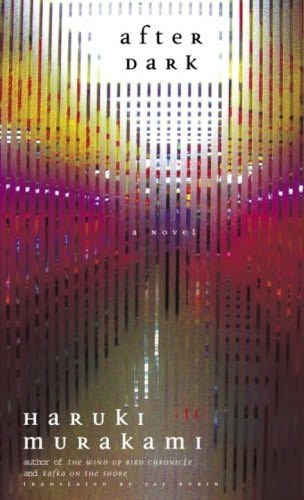
After reading my second book by Murakami, I'm nearly ready to add him to the list of favorite authors. Like
Norwegian Wood, it's a masterfully crafted novel engaging the reader in each word that he writes. This is a very different sort of novel from
Norwegian Wood though in it's content. With
After Dark
, I've discovered the bizarre side of Murakami that I hear so much about. Murakami throws us into what is seemingly another dimension, but in reality is only the middle of the night when bizarre things tend to happen. What if we pushed the boundaries of reality just a tad...not enough to really turn this into a dark fantasy, but enough to make the night ethereal, a bit mysterious.
Murakami has a very unique style of writing with this one. Much of the book is "viewed" almost through a camera lens...with stage directions given. It's a very voyeuristic novel, bringing us from one situation in the middle of the night with one character, to another situation with some thread of connectivity between the two. It's really not a novel about much, without much action, but at it's heart, beyond just the outward content, it's about so much. It's about our connections with one another, the strength of those connections, the guilt that lies within, the games we play, the jealousy we feel, the love we feel, the happy times we share, and the sad times we share. It's a book about the mystery of the night time, the barrier between reality and the imaginable after dark.
We open the novel with a visit to nineteen Mari Asai as she sits in a Denny's alone reading a novel. She's soon visited by an old acquaintance who is playing in a band down the street. His name is Takahashi and he once went on a date with her and her sister in high school. The two have a conversation that is characteristic of the novel. It's just a conversation about catching up which leads to deeper conversation. Not much plot is developed. But it works perfectly. Throughout the novel, we have more crossings between the two in a dark district of Japan. We have some action (involving prostitutes in a love hotel) but mostly it's just more conversation.
Mari and Takahashi's conversations bring us to Mari's sister, Eri Asai. Eri sleeps throughout the novel. That's really all she does. We enter her bedroom as an observer...not really there, but watching her sleep. She lies peacefully on her pillow, beautiful with her black hair spread across her pillow. Then the tv begins to come on in the room and things get a little creepy. There is a man in the tv sitting in an empty room except for the chair that he is seated on. He stares out of the tv as the picture adjusts, seemingly watching Eri sleep. His face is not visible though due to some strange plastic like substance covering it. Here is where the novel crosses into the ethereal. It's haunting and wonderful and bizarre all at the same time.
Like I said, not much happens in this novel, but it doesn't need to. The stories all begin to connect somewhat, but basically it's a story about the happenings between midnight and seven AM in a town in Japan. It's extremely engaging and surprisingly creepy at times. I wasn't expecting that at all. But then again, there's always an air of creepiness throughout the night.
I feel like I haven't done much justice to this book, but it's really a hard one to review. My best recommendation is to check it out yourself. While
Norwegian Wood still remains my favorite Murakami work, this one is certainly a great contender. I think I'm finally ready for
The Wind Up Bird Chronicle now.
This is my last read for Bellezza's Japanese Reading Challenge, but I still plan on reading one more anyway. I'm going to read Yukio Mishima's
Confessions of a Mask.
Dewey wasn't nuts about this book, but she read it too...so I'm counting it as a 2008 read for the Dewey's Books Reading Challenge.
 After reading my second book by Murakami, I'm nearly ready to add him to the list of favorite authors. Like Norwegian Wood, it's a masterfully crafted novel engaging the reader in each word that he writes. This is a very different sort of novel from Norwegian Wood though in it's content. With After Dark
After reading my second book by Murakami, I'm nearly ready to add him to the list of favorite authors. Like Norwegian Wood, it's a masterfully crafted novel engaging the reader in each word that he writes. This is a very different sort of novel from Norwegian Wood though in it's content. With After Dark After reading my second book by Murakami, I'm nearly ready to add him to the list of favorite authors. Like Norwegian Wood, it's a masterfully crafted novel engaging the reader in each word that he writes. This is a very different sort of novel from Norwegian Wood though in it's content. With After Dark
After reading my second book by Murakami, I'm nearly ready to add him to the list of favorite authors. Like Norwegian Wood, it's a masterfully crafted novel engaging the reader in each word that he writes. This is a very different sort of novel from Norwegian Wood though in it's content. With After Dark
No comments:
Post a Comment